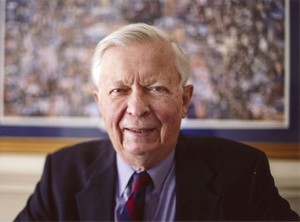 DEGREE: B.A. in English; LL.B., University of Pennsylvania Law School
DEGREE: B.A. in English; LL.B., University of Pennsylvania Law School
JOB TITLE: Lobbyist and consultant with Malady & Wooten
FAVORITE TRINITY MEMORY: The faculty-student debate on the Eisenhower/Stevenson 1956 election held in front of a large crowd in the dining hall. Professor George Cooper and I spoke for the Democrats, and Professor Brinton Thompson and Dyke Spear spoke for the Republicans. It was a lively affair, highlighted by sharp exchanges and good humor.
Can you briefly describe the amendment to the Pennsylvania Constitution that you wrote and explain what it does? The first sentence establishes in the people of Pennsylvania a constitutional right to a decent natural environment on the same plane as the constitutional rights to free speech and freedom of religion. This amendment is Section 27 of the state constitution’s Declaration of Rights, Article 1. The second sentence establishes that public natural resources–such as the air and streams–are the common property of Pennsylvanians, including those not yet born. The last sentence places on state government a trusteeship obligation to conserve and protect these resources in the public interest. This is a complete reversal of how, in the century following the Civil War, Pennsylvania government had aided and abetted the coal, steel, and rail industries in brutally exploiting our state’s natural resources.
What motivated you to enshrine environmental rights in the constitution in 1977? In 1966 I was elected to the Pennsylvania House of Representatives by defeating a 14-term incumbent who had voted against bringing the coal industry under The Clean Streams Law. My election was the first showing of the significant political force that the environmental cause was becoming. I was given a seat on the House Conservation Committee, which became the center of robust environmental activism. It was like sitting on a revolutionary tribunal passing judgment on the environmental past and promulgating new directions for the future. In a few short years of Pennsylvania’s environmental revolution, we passed more environmental bills than in all of the state’s history before or since–a comprehensive clean streams law, air pollution law, strip mining control, abandoned mine land restoration, a new department of environmental protection, and others. While this legislation was going through our committee, it occurred to me that these new laws are great, but they could be relatively easily changed or weakened when the environmental tide of public opinion receded. We needed something stronger and more permanent, and a constitutional amendment was the obvious answer.
How was the amendment used in the Supreme Court’s decision in the Robinson Township case? For the first time, a court reviewed the history of the amendment and pronounced its intent. The opinion said that Article 1, Section 27 should be given the plain English meaning of its words, that people have a right to a decent environment, that the public natural resources belong to the people, and that the state has a trusteeship duty. To reach these conclusions, the court relied in large measure on statements I made on the House floor when the proposal was under consideration and twice cited my book, Clean Politics/Clean Streams, and even used an excerpt from the book. With that, the court declared invalid three sections of the gas-drilling law. The case is an environmental law landmark in Pennsylvania and is forcing public officials throughout the state to rethink their roles under Article 1, Section 27.
How did you react when you heard about the decision? I was taken by surprise. I had no involvement in the litigation or any role in the enactment of Act 13. The court’s declaration of the intent of the environmental amendment, as laid out by me on the House floor in 1970 and 1971 and described in my book, was the most stunning experience of my legislative and legal career. It took 40 years but is well worth the wait.
How did your time at Trinity influence your path in life? In many ways, but especially in learning the value of academic discipline in reading and analyzing issues, as well as opening my mind to new ideas and developing some willingness to consider new information.
Was there a professor who was particularly influential? If so, who was it, and why? Professor George B. Cooper of the History Department. I have always admired his professional forensic skill in his class lectures. He taught English history in such a way that it has always been a major interest, especially the evolution of parliamentary government and the concept of political rights. This has been of great importance to my work as a state legislator and to my writing two books about legislatures.